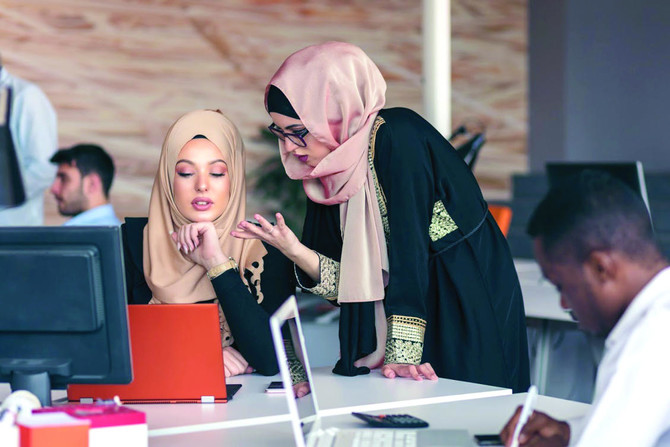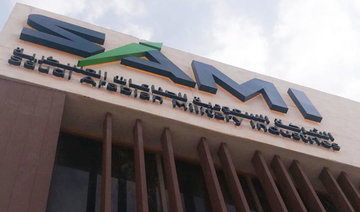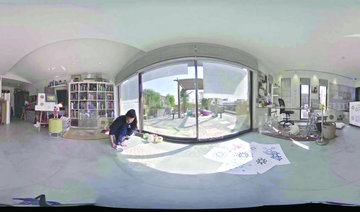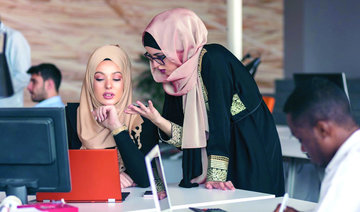NEW HAMPSHIRE: From 4,000 miles away, Saudi students in the US have been watching a political transformation unfold in their homeland with a renewed sense of hope for their own futures — and for the future of a country in a region beset by turmoil.
Since becoming crown prince in June, Mohammed bin Salman has embarked on a series of bold policies designed to curb corruption, push back against religious extremism and confront an expansionist Iran.
Domestically, social reforms have been high on the agenda, including the headline-grabbing decision to allow women to drive. Prohibitions on women driving had consistently been invoked by Saudi Arabia’s overseas friends and critics alike as an unacceptable restriction on civil rights.
“When I came to the US, the first thing I did was get my driving license and get my own car to drive,” said Siham Karkaah, a 33-year-old Saudi student from Riyadh. She arrived in the US in August, and is studying for a master’s degree in education at Southern New Hampshire University (SNHU).
A month after she arrived, the crown prince issued a decree that means she will be able to drive when she returns to Saudi Arabia after completing her studies, something she plans to do.
“I have always been supportive of women’s rights, and I definitely believe in that and women’s freedom, and doing what you want to do as a woman.
“I fully support the changes that have been made. When I do go home, it will be to a different country,” she said.
Karkaah’s enthusiasm was echoed by other young Saudis studying in the US, who believe the crown prince understands their dreams and aspirations far better than previous leaders.
“It’s really important that the crown prince is close to our age; it means he understands our generation. We have a new way of thinking, and he does, too,” said Abdullah Al-Mutairi, 26, another SNHU student from the Kingdom.
He also supported the crown prince’s anti-corruption drive, which included seizing assets from some wealthy members of the Saudi royal family and prominent businessmen.
The crown prince’s methods have provoked concern in the US about respect for property rights and due process, although there is a widespread belief among US experts and Saudi expats that serious action against financial corruption was needed.
“I wasn’t expecting the crown prince to do what he did, but I’m glad he chose to,” Al-Mutairi, a business studies student, said.
Although supportive of the decision to let Saudi women drive, Al-Mutairi said the measure would run up against a strong strand of conservatism in Saudi society.
“Women may now be legally allowed to drive, but if there are men in their family who don’t want them to, that is a real barrier. The women could go to court, and they could win, but it might mean breaking ties with their family, which would be a huge sacrifice,” he said.
Saudi students typically come to the US to benefit from a learning environment they say is more open, supportive and of higher quality than they are able to get at home. Fees are usually paid by a Saudi government-funded scholarship fund, which also covers living costs.
SNHU, in the New Hampshire city of Manchester, is considered one of the most innovative higher education establishments in the US and has long been popular with Saudi students.
Another SNHU student, Hussam Samir Al-Deen, said he had longed to visit the US and had learned a great deal from his time there. He hopes to find work in the US after graduating, but expects to return home one day.
The 28-year-old from Jeddah said he tried to be a good ambassador for his nation. “Most Americans I’ve met have been very nice, but some have the wrong impression about Saudi Arabia and about Islam. I hope I have helped to improve their view,” he said.
Al-Deen said he and friends had suffered isolated cases of racism, or had been called terrorists by people in the street.
“I just ignore them, they don’t really understand what they are saying — most people are very kind,” he said.
His years studying in the US had changed him and some of his views on culture, he said. If there was one social reform that could be added to the list of those underway in Saudi, he hoped it would be a shift in the nature of personal relationships.
“In Saudi Arabia, it is more difficult to be friends with women, or to work alongside women, and it is not always accepted that you get to marry the woman you love. Instead you are supposed to marry and hope you fall in love with your wife afterwards. I would like to see those things change one day,” he said.
Saudi students abroad are watching in hope as dramatic reforms in the Kingdom promise a new era of optimism
https://arab.news/rpc6n
Saudi students abroad are watching in hope as dramatic reforms in the Kingdom promise a new era of optimism

How Saudi Arabia is using innovation, research, and regulation to turn waste into a circular economy success

- Engineering, AI and cross-sector partnerships are driving sustainable solutions to manage 110 million tons of waste annually
- New laws, financial incentives and rising investor interest are reshaping the Kingdom’s waste management and recycling landscape
RIYADH: As Saudi Arabia accelerates toward a circular economy under Vision 2030, experts say universities, research institutions, and business leaders are playing a crucial role in developing innovative waste management solutions that align with national sustainability goals.
In early 2024, Saudi Arabia’s Ministry of Environment, Water and Agriculture announced a waste management plan aiming to recycle up to 95 percent of waste and add SR120 billion ($31.99 billion) to the Kingdom’s gross domestic product.
Saudi Arabia generates more than 110 million tons of waste each year, much of it originating from cities like Riyadh, Jeddah, and Dammam. Its waste management market is projected to grow from $5.97 billion in 2025 to $8.72 billion by 2030, according to Mordor Intelligence.

To meet this challenge, academic partnerships, regulatory reforms and emerging technologies are coming together to reshape the sector, Sultan Al-Muaythir, chairman of the civil engineering department at Prince Sattam bin Abdulaziz University, told Arab News.
Forming knowledge-sharing agreements with leading countries in waste management, he said, is a strategic step toward building a sustainable, locally adapted system that draws on global best practices and aligns with Saudi Arabia’s circular economy ambitions.
To drive innovation in the sector, Al-Muaythir emphasized the importance of interdisciplinary support. Fields like civil engineering, landfill and waste management, geotechnical engineering, and soil sciences all contribute to the design and development of critical infrastructure.

Mechanical engineering plays a key role in advancing collection and treatment equipment, while chemical, agricultural and biotechnology engineering disciplines help analyze waste composition and develop transformation processes.
Electrical engineering, he added, is essential for operating smart systems and managing energy generated through treatment.
Al-Muaythir also pointed to the Kingdom’s updated regulatory landscape, particularly the introduction of the Waste Management Law and its executive regulations, as a strong foundation for encouraging innovation and investment in sustainable practices.
He explained that the next phase calls for faster plan implementation, broader international research collaboration and direct incentives for advanced processing technologies — steps that would speed up the Kingdom’s progress toward its environmental and development goals.
While government action is essential, Al-Muaythir said innovation in waste management is not a luxury, but a necessity for building a clean environment and a functioning circular economy.
He added that individual responsibility plays an equally important role. “Adopting conscious behaviors towards waste and committing to sorting and reuse/recycling constitute the first building blocks in creating a more sustainable future,” he said.
Expanding on this vision, Abdullah Alakel, chairman of the Saudi Scientific Research and Innovation Association, said waste management innovation is a cornerstone of Vision 2030’s broader goal to build a circular and sustainable economy.

He told Arab News that scientific research is a key driver in tackling environmental challenges — from recycling and waste-to-energy technologies to the use of artificial intelligence to improve sorting and collection processes — ultimately boosting operational efficiency and reducing environmental harm.
To support this ecosystem, the association provides business incubators and innovation accelerators, offering technical and financial assistance. It also facilitates connections between researchers, donors and investors to help turn ideas into market-ready solutions.
Alakel noted that several joint initiatives with academic and industrial partners are already underway, including efforts to convert organic waste into economic products such as fertilizers and biofuels.
DID YOU KNOW?
• Saudi Arabia aims to recycle up to 95 percent of its waste by 2040. Waste management sector is projected to contribute $32bn to GDP by 2040.
• Half of the Kingdom’s waste comes from Riyadh (21 percent), Jeddah (14 percent) and Dammam (8 percent).
(Sources: Ministry of Environment, Water and Agriculture and the National Center for Waste Management)
Other projects aim to develop scalable recycling technologies and improve overall waste management efficiency.
Beyond research, the association works to foster a culture of sustainability across society. Alakel said it organizes public awareness campaigns, educational workshops in schools and universities, and national competitions that encourage creative, environmentally responsible solutions.
He added that the association plays a critical role in bridging academia and implementation by hosting scientific conferences, building strategic partnerships and supporting national innovation deployment in alignment with Vision 2030’s environmental goals.
Farah Al-Gharib, CEO of Precision & Choice Environmental Solutions, echoed those views, underscoring the opportunity to enhance coordination between stakeholders as Saudi Arabia moves toward a circular economy.

She told Arab News that aligning regulations, expanding infrastructure for sorting and collection, and stimulating private investment remain key challenges. Raising public awareness and promoting innovation are also essential to achieving sector-wide transformation.
To accelerate progress, Al-Gharib called for a more integrated and flexible system that encourages public-private partnerships. Activating source-level sorting and offering financial incentives to investors, she said, would help drive growth in the sector.
Clear metrics, such as waste reduction, cost savings and job creation, should be used to measure success.

Looking ahead, she expects more companies to invest in smart technologies and expand their collection and treatment networks. Seamless integration across the entire waste value chain — from source to processing and redistribution — is essential, she said, to avoid bottlenecks and uphold the core principles of the circular economy.
“Based on our experience in the sector, we believe that unifying and updating regulations under a single, clear, and transparent regulatory framework would directly contribute to attracting investors, reducing the complexity of procedures and the classification of recyclable products, thereby accelerating regulatory processes and stimulating production,” said Al-Gharib.
She concluded that clear legislation and coordinated responsibilities across authorities are key to scaling up circular economy initiatives effectively and sustainably.

Hayy Cinema hosting classic movie program for children in Jeddah

- The program includes twice daily screenings of classic Arab cartoons that have left a lasting impression on viewers and a complementary range of artistic activities inspired by the films
JEDDAH: Hayy Cinema in Jeddah is running an entertainment program that provides an interactive experience to evoke childhood memories and strengthen cultural bonds between generations.
The program includes twice daily screenings of classic Arab cartoons that have left a lasting impression on viewers and a complementary range of artistic activities inspired by the films.
Hayy Cinema, which is an Art Jameel initiative, provides a unique approach to film presentation. Its facilities include a 168-seat theater, private screening room, multimedia library and an educational exhibition, all designed with architectural inspiration drawn from the history of Gulf cinema.
The children’s program runs until Sunday.
Falcon breeders auction to be launched in August

- The season will start with the International Falcon Breeders Auction, running from Aug. 5-25, showcasing top local and international falcon farms
RIYADH: The Saudi Falcons Club has announced its schedule for the current year, featuring six major events spanning a total of 122 days in Malham, north of Riyadh, and other venues across the Kingdom.
The event is designed to engage a broad audience interested in falconry, hunting and related cultural traditions.
The season will start with the International Falcon Breeders Auction, running from Aug. 5-25, showcasing top local and international falcon farms.
The Saudi Falcons Club Auction will run from Oct. 1 to Nov. 30, serving as a key platform for presenting top local falcons and providing a reliable economic avenue for falconers.
The International Saudi Falcons and Hunting Exhibition, the largest of its kind in the region, will take place from Oct. 2-11. It will feature exhibitors from both within and outside the Kingdom, showcasing the latest equipment and supplies for falconry, hunting, travel, weapons and outdoor adventures.
Saudi transport officials conduct more than 317,000 inspections in June

- Makkah region reported the highest number of offenses at 21,000, followed by Riyadh at 13,000, Eastern Region at 4,508, and Madinah at 3,557
RIYADH: The Saudi Transport General Authority carried out more than 317,000 inspections covering land, sea, and rail transport activities across the Kingdom in June, identifying 51,143 offenses.
Of these, 27,756 were detected through field inspections and 23,387 through automated monitoring, while all efforts involved collaboration with relevant authorities, the Saudi Press Agency reported.
Compliance rates were robust, with land transport achieving 94 percent compliance and maritime transport recording an impressive 99 percent. These figures highlight licensees’ strong adherence to the rules and regulations.
Makkah region reported the highest number of offenses at 21,000, followed by Riyadh at 13,000, Eastern Region at 4,508, and Madinah at 3,557. Qassim recorded 1,914 violations, Tabuk 1,316, and Aseer 1,073, while the remaining violations were from other parts of the Kingdom.
Japan’s crown prince visits Saudi pavilion at Osaka Expo

- Visited in the company of Saudi Ambassador to Japan Ghazi Faisal Binzagr.
TOKYO: Japan’s Crown Prince Fumihito and Crown Princess Akishino visited Saudi Arabia’s pavilion at the Osaka-Kansai Expo on Thursday, in the company of Saudi Ambassador to Japan Ghazi Faisal Binzagr.
“We were deeply honored by the visit of their Imperial Highnesses,” Binzagr told Arab News Japan. “It was a beautiful visit.”
He noted how much the pair had enjoyed the music of the oud, which was being played as the imperial guests entered the courtyard of the pavilion and which echoed throughout the building owing to the design of the walls and corridors to amplify the sound.
“The imperial couple also enjoyed Saudi coffee and (a selection of various) dates,” Binzagr said, adding that the variety and color of Saudi dates is influenced by the minerals in the soil of each region where they are grown in the Kingdom.
Binzagr said they had discussed the similarities in the cultures of Saudi Arabia and Japan, adding that despite appearing different, they shared a deep pride in their heritage and history, and both countries' ability to link the East and West.
He added that Japan is authentic with what it has but is also able to blend it with foriegn best practices with its great openness. Binzagr said that he believes this makes for something very special that Saudi Arabia also shares with Japan.
“We both value our roots and connectivity, and we both seek to celebrate balance in everything we do,” he said.
At the pavilion, the imperial couple viewed the plan for Riyadh Expo 2030 and indicated they were keen to visit at that time or even before, Binzagr said.
“We are keenly looking forward to more visits between members of Japan’s Imperial Family and members of our Royal Family of Saudi Arabia,” Binzagr added.
”Such visits add a special dimension to an already special relationship.”






















